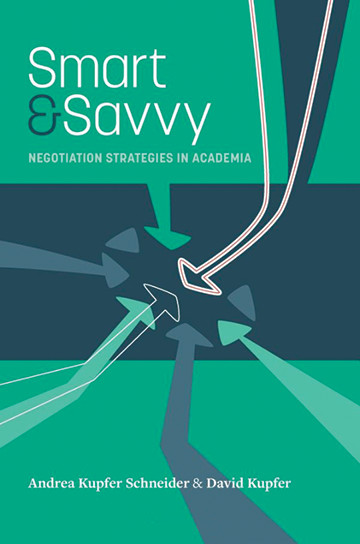Smart & Savvy: Negotiation Strategies in Academia aims to teach a topic that intimately affects us every day: negotiation. The authors, Andrea Kupfer Schneider and David Kupfer, make the goals explicit: to raise awareness about different approaches to negotiation and to highlight skills necessary to execute each approach in an academic setting. These skills include assertiveness, empathy, flexibility, and social intuition.
The first part of the book provides background of and evidence-based tools for negotiation. Scales, such as the Dynamic Negotiating Approach Diagnostic (DYNAD), engage the reader in purposeful self-reflection and goal-oriented understanding. The DYNAD, designed by the authors themselves and based on Thomas Kilmann’s Conflict Mode Instrument (p. 13), helps distinguish patterns of negotiation that a person adopts in a specific situation. On a simple two-dimensional scale, where the x axis represents level of empathy and the y axis level of assertiveness, the authors plot five different styles of negotiation: competing, accommodating, avoiding, compromising, and collaborating. By objectively identifying default tendencies, a reader can better take note of such behaviors in everyday interactions.
The second half of Smart & Savvy: Negotiation Strategies in Academia shifts the focus from foundational components of negotiation vis-à-vis the individual to applied strategies in scenarios inexorably linked to an academic career. Chapters provide narratives of common dilemmas pertaining to different stages of an academic career, from fellowship to tenure to retirement. These case-like presentations cover relatable challenges such as ownership of data, a tense relationship with a supervisor, shared authorship, and work-life balance. More difficult to address directly are nuances such as the politics of each department; personalities of advisers; and personal interest involving prestige of programs, individual need for security, and location. Nevertheless, the authors emphasize that each stage of life in academia requires different approaches, generally with competitiveness and flexibility early rather than accommodation and avoidance. Collaboration is emphasized throughout, especially during tenure.
Smart & Savvy: Negotiation Strategies in Academia is unique in its nonjudgmental approach to different personality styles and in its ability to provide perspective. Aside from scales, the authors employ other tools to engage the reader, such as analogy—a comparison of ski-slope levels to those of negotiation difficulty—and cognitive-behavioral therapy methods, such as the “six hats technique” (pp. 51–52), “magic wand” (pp. 51–52), and “pros and cons of each mode of communication” (p. 78). Triads of advice are made down to earth, easy to remember, and applicable, such as making sure one’s goals are “specific, reasonable, and aspirational” (p. 33). Indeed, the book adopts a colloquial and practical tone. Chapters are short and readable. Information, intermingled with pop culture references from President Lincoln to basketball coach John Wooden to the novel To Kill a Mockingbird, is easy to retain.
In summary, I would say that Smart & Savvy: Negotiation Strategies in Academia is a must read for people who want to improve their negotiation skills, whether in their personal life or career. Those who are familiar with the basics of negotiation can skip to the latter part of the book that addresses different scenarios in academia. Those who are not in academia may choose to read only the first part of the book. The topic of negotiation pervades multiple aspects of life, and Smart & Savvy has universally applicable pearls.


